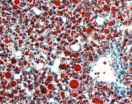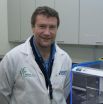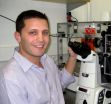(Press-News.org) Berkeley — A gene that helps the body convert that big plate of holiday cookies you just polished off into fat could provide a new target for potential treatments for fatty liver disease, diabetes and obesity.
Researchers at the University of California, Berkeley, are unlocking the molecular mechanisms of how our body converts dietary carbohydrates into fat, and as part of that research, they found that a gene with the catchy name BAF60c contributes to fatty liver, or steatosis.
In the study, to be published online Dec. 6 in the journal Molecular Cell, the researchers found that mice that have had the BAF60c gene disabled did not convert carbohydrates to fat, despite eating a high-carb diet.
"This work brings us one step forward in understanding fatty liver disease resulting from an excessive consumption of carbohydrates," said the study's senior author, Hei Sook Sul, professor at UC Berkeley's Department of Nutritional Science and Toxicology. "The discovery of this role of BAF60c may eventually lead to the development of treatment for millions of Americans with fatty liver and other related diseases."
More than three-quarters of obese people and one-third of Americans have fatty liver, or steatosis, according to epidemiological studies. A diet excessively high in bread, pasta, rice, soda and other carbohydrates is a major risk factor for fatty liver, which is marked by the abnormal accumulation of fat within a liver cell.
After a meal, carbohydrates are broken down into glucose, an immediate source of energy. Excess glucose gets stored in the liver as glycogen or, with the help of insulin, converted into fatty acids, circulated to other parts of the body and stored as fat in adipose tissue. When there is an overabundance of fatty acids, fat also builds up in the liver.
"Fatty liver caused by the high intake of carbohydrates can be as bad as that due to excessive alcohol intake, and it contributes to various diseases including type 2 diabetes," said Sul. "The conversion of excess glucose into fatty acids occurs in the liver, but there are many steps in this process that have not been fully understood."
Sul's lab previously reported the role of a gene called DNA-PK in this process. The researchers found that DNA-PK, known to help repair breaks in DNA, acts as a signaling molecule for insulin that enhances the formation of fat from carbohydrates in the liver.
The newest discovery puts the spotlight on BAF60c, a molecule known for its role in remodeling the structure of chromatin, a mass of DNA and proteins found in the cell's nucleus.
The lead authors of the study, postdoctoral researcher Yuhui Wang and former graduate student Roger Wong, both at Sul's laboratory, discovered BAF60c's role in the conversion of dietary carbohydrates to fat. They found that BAF60c resides in the cytoplasm, outside the cell's nucleus. Once insulin binds to a receptor on the cell surface, it sends a signal to modify BAF60c so that it enters the nucleus. There, BAF60c binds to regions of chromatin that contain genes coding for various enzymes involved in the conversion of carbohydrates to fat. This action sends the signal to churn out more of the enzymes, enhancing the conversion of carbohydrates to fat.
The researchers tested the role of BAF60c by both increasing and decreasing its function in various experiments in live mice. Mice that had triple the normal levels of BAF60c in their livers produced significantly higher levels of fat-producing genes, even when they were fasting. In contrast, disabling BAF60c disrupted the formation of fatty acids, even when the mice feasted on a carb-heavy diet.
The researchers point out that fatty liver disease can result from overindulging in carbohydrates. They suggest avoiding refined sugars that increase blood insulin levels quickly, but note that there are complex carbohydrates — such as those in legumes, fruits and vegetables — that should be part of a healthy diet.
"Limiting consumption of sodas, cakes and cookies is a good idea for many reasons, even during the holidays," said Sul.
INFORMATION:
The National Institutes of Health supported this study.
Study IDs gene that turns carbs into fat
Discovery could help development of treatment for fatty liver, diabetes
2012-12-06
ELSE PRESS RELEASES FROM THIS DATE:
ACNP: Novel NMDA receptor modulator significantly reduces depression scores within hours
2012-12-06
HOLLYWOOD, FL and EVANSTON, IL, December 6, 2012 -- Naurex Inc., a clinical stage company developing innovative treatments to address unmet needs in psychiatry and neurology, today reported positive results from a Phase IIa clinical trial of its lead antidepressant compound, GLYX-13. GLYX-13 is a novel partial agonist of the NMDA receptor. The Phase Ila results are being presented this week at the 51st Annual Meeting of the American College of Neuropsychopharmacology (ACNP).
The Phase IIa results show that a single administration of GLYX-13 produced statistically significant ...
Research yields understanding of Darwin's 'abominable mystery'
2012-12-06
Research by Indiana University paleobotanist David L. Dilcher and colleagues in Europe sheds new light on what Charles Darwin famously called "an abominable mystery": the apparently sudden appearance and rapid spread of flowering plants in the fossil record.
Writing in the Proceedings of the National Academy of Sciences, the researchers present a scenario in which flowering plants, or angiosperms, evolved and colonized various types of aquatic environments over about 45 million years in the early to middle Cretaceous Period.
Dilcher is professor emeritus at IU Bloomington ...
Environmental chemical blocks cell function
2012-12-06
Bisphenol A, a substance found in many synthetic products, is considered to be harmful, particularly, for fetuses and babies. Researchers from the University of Bonn have now shown in experiments on cells from human and mouse tissue that this environmental chemical blocks calcium channels in cell membranes. Similar effects are elicited by drugs used to treat high blood pressure and cardiac arrhythmia. The results are now presented in the journal "Molecular Pharmacology."
The industrial chemical bisphenol A (BPA) is worldwide extensively utilized for manufacturing polycarbonates ...
New evidence for epigenetic effects of diet on healthy aging
2012-12-06
New research in human volunteers has shown that molecular changes to our genes, known as epigenetic marks, are driven mainly by ageing but are also affected by what we eat.
The study showed that whilst age had the biggest effects on these molecular changes, selenium and vitamin D status reduced the accumulation of epigenetic changes, and high blood folate and obesity increased them. These findings support the idea that healthy ageing is affected by what we eat.
Researchers from the Institute of Food Research led by Dr Nigel Belshaw, working with Prof John Mathers and ...
New understanding can lead to srategies for dealing with neurodegenerative diseases
2012-12-06
Jerusalem Dec. 6, 2012 – A new understanding of what takes place on the cellular level during the development of neurodegenerative diseases, such as Parkinson's, Alzheimer's, ALS and Huntington's diseases, offers promise towards possible new strategies for combating such diseases, say Hebrew University of Jerusalem researchers.
Neurodegenerative conditions result from an impairment of motor function or cognitive function or both. This impairment results from degeneration in the particular area of the brain responsible for those functions.
Although these neurodegenerative ...
'Releasing' people from Catholic guilt increases generosity towards church, research shows
2012-12-06
People who recall being absolved of their sins, are more likely to donate money to the church, according to research published today in the journal Religion, Brain and Behavior.
Researchers from Royal Holloway and the University of Oxford assigned participants two memory tasks. In the first, they were asked to privately recall a sin that they had committed in the past, while in the second, they recalled attending confession for this sin or imagined doing so, if they had not confessed in reality.
Each participant was also given an opportunity to donate to a local Catholic ...
My microbes
2012-12-06
We all have E.coli bacteria in our gut but each of us carries a version that is genetically slightly different. The same can be said of most gut microbes: our own gut metagenome, that is the sum of all the genomes of all our gut microbes, appears to be really specific to each of us, and to remain stable over time. For the first time, researchers from the European Molecular Biology Laboratory (EMBL) have studied this metagenome at such a high resolution that individual mutations in the various strains could be analysed. Their findings, published today in Nature, could have ...
Insight into DNA reprogramming during egg and sperm cell development
2012-12-06
Scientists at the Babraham Institute have gained a new understanding of when and how the DNA in developing egg and sperm cells is 'reset', in preparation for making a new embryo. It is well known that small chemical groups can be added to DNA to alter gene activity, these modifications to the DNA are acquired during development in the womb and throughout adult life and can arise from changes in environment. Most of these modifications are removed in immature egg and sperm cells to 'reset' the DNA and to erase any 'environmental memory', but some remain. Decoding this reprogramming ...
Cocktail boosts immune cells in fighting cancer
2012-12-06
Fighting cancer using the body's own defense system is a promising treatment approach. Immune therapies have even become clinical routine in treating a few cancers such as malignant melanoma and prostate cancer. Natural killer cells (or NK cells) are considered to be particularly suitable weapons against cancer. They are part of the innate immune system and respond to a wide range of cancer cells of diverse origin. Moreover, NK cells also kill tumor cells that have lost a specific target and go unnoticed by other immune cells.
"The big problem in using NK cells for therapy ...
Warm sea water is melting Antarctic glaciers
2012-12-06
The ice sheet in West Antarctica is melting faster than expected. New observations published by oceanographers from the University of Gothenburg and the US may improve our ability to predict future changes in ice sheet mass. The study was recently published in the journal Nature Geoscience.
A reduction of the ice sheets in Antarctica and Greenland will affect the water levels of the world's oceans.
It is therefore problematic that we currently have insufficient knowledge about the ocean circulation near large glaciers in West Antarctica. This means that researchers ...
LAST 30 PRESS RELEASES:
Nanoplastics can interact with Salmonella to affect food safety, study shows
Eric Moore, M.D., elected to Mayo Clinic Board of Trustees
NYU named “research powerhouse” in new analysis
New polymer materials may offer breakthrough solution for hard-to-remove PFAS in water
Biochar can either curb or boost greenhouse gas emissions depending on soil conditions, new study finds
Nanobiochar emerges as a next generation solution for cleaner water, healthier soils, and resilient ecosystems
Study finds more parents saying ‘No’ to vitamin K, putting babies’ brains at risk
Scientists develop new gut health measure that tracks disease
Rice gene discovery could cut fertiliser use while protecting yields
Jumping ‘DNA parasites’ linked to early stages of tumour formation
Ultra-sensitive CAR T cells provide potential strategy to treat solid tumors
Early Neanderthal-Human interbreeding was strongly sex biased
North American bird declines are widespread and accelerating in agricultural hotspots
Researchers recommend strategies for improved genetic privacy legislation
How birds achieve sweet success
More sensitive cell therapy may be a HIT against solid cancers
Scientists map how aging reshapes cells across the entire mammalian body
Hotspots of accelerated bird decline linked to agricultural activity
How ancient attraction shaped the human genome
NJIT faculty named Senior Members of the National Academy of Inventors
App aids substance use recovery in vulnerable populations
College students nationwide received lifesaving education on sudden cardiac death
Oak Ridge National Laboratory launches the Next-Generation Data Centers Institute
Improved short-term sea level change predictions with better AI training
UAlbany researchers develop new laser technique to test mRNA-based therapeutics
New water-treatment system removes nitrogen, phosphorus from farm tile drainage
Major Canadian study finds strong link between cannabis, anxiety and depression
New discovery of younger Ediacaran biota
Lymphovenous bypass: Potential surgical treatment for Alzheimer's disease?
When safety starts with a text message
[Press-News.org] Study IDs gene that turns carbs into fatDiscovery could help development of treatment for fatty liver, diabetes


